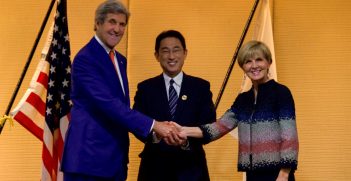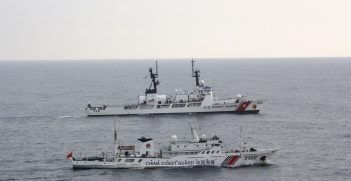Canada's China Conundrum

Fear is prompting Canadian policymakers to take the path of least resistance with China. Is this fear justified, or is the key to relations with China to understand that it has become a “paper tiger?”
Bilateral relations between Canada and China are at an all-time low. The arrest of Meng Hangzhou, a senior executive of the Chinese firm Huawei, at Vancouver airport late last year has resulted in a series of judicial and trade measures meant to punish Canada.
The Chinese version of events rings true on a number of points. The Liberal Party government of Justin Trudeau has acted much like an American vassal. Its fear of US President Donald Trump is tangible and the recent United States-Mexico-Canada Agreement (USMCA) trilateral trade agreement is positive proof of that. Canada made concessions on several fronts, including in agriculture and auto, while obtaining nothing more than lip service in return. The recent “lifting” of steel and aluminum tariffs, hailed as a great victory by the Trudeau-Freeland duo, is really nothing more than a US insurance policy on Chinese dumping into their market. The panel disputes mechanism is dead in the water since it has no executive authority. On the vassal argument, the Chinese appear to have correctly perceived the absence of Canadian leadership and unwillingness to negotiate as equals on the international scene. What is even more perplexing, if not pathetic, is the notion raised last week by former Progressive Conservative Prime Minister Brian Mulroney to send Jean Chrétien, another ex-PM and his wealthy son-in-law-in law, to China in a vainglorious attempt at freeing the detained Canadians and solving the pseudo trade imbroglio.
And the Canadians? Fear of the unknown, fear of reprisals and fear of fear itself is the animating force here. Of the many Canada-China experts I have consulted, all have chosen the path of least resistance and refused any notion of measures to punish China for its illegal detention of Canadians and pseudo trade measures aimed to close their market to Canadian exports such as canola, pork, fish and others.
In both cases, with the USA and China, the common argument is to lay low and hope for the best. In the case of the detention of Michael Kovrig and other Canadians held illegally in China, the answer has been to beg President Trump to intercede as a sideline to the ongoing US-China trade war. Clearly Canadian authorities have forgotten Munich 1938 along with any principles Winston Churchill might have loaned us from his defense of British territorial integrity when faced with a mightier foe in 1940. All of this is positive proof that present Canadian foreign policy is not independent at all. It is malleable to blackmail, threats and big sticks. Fear is the codeword. Fear, and more fear.
Let’s take China’s case now. China has long abandoned its leadership of the non-aligned countries of the world. It has become a crass anti-democratic aristocracy of so-called communists acting like capitalists. Its behaviour in the United Nations is cynical, brutal and devoid of any idea of elementary justice: as evidenced by its continuing support for the criminal Bashar al-Assad regime in Syria. Its mass consumer market allows China’s blackmail of smaller capitalist countries to be even more powerful. In business lingo, they become the jealous market for Canadian agricultural products.
How can a much smaller country like Canada overcome such powerful odds? Relying on trade measures is a losing game given the numbers. Up to now, Canadian authorities have been unsuccessful in moving the dial, either by itself or with support from allies like the US. Such is the poverty of foreign policy in a country with material and intellectual riches beyond measure. Prime Minister Justin Trudeau and Foreign Minister Chrystia Freeland deserve blame for the present defeatism but the rot in Global Affairs, Canada’s foreign service, began well before their arrival on the scene.
Many years ago, the Chinese leader Mao Tse Tung called western capitalist powers “a paper tiger.” Little could he have foreseen that the key to moving the dial on China is to understand that it too has become a paper tiger. The old dialectical law of the negation of the negation has transformed China into its opposite: a large unwieldy mass of minorities and capitalists run by a Communist Party autocracy, fully engaged in the pursuit of rapacious profit. Today’s China resembles the Soviet Union of yesterday, an edifice slowly crumbling under the weight of ever greater anticipated wealth.
To develop a successful China strategy, I propose four essential vectors of activity.
1. Canada must pursue an independent foreign policy not only vis-à-vis China but with regard to its chief North American trading partner. It must act as a permanent foil to the Chinese argument that Canada is in Uncle Sam’s hip pocket.
2. Canada must offer financial and political support to the Uyghurs in China, to publicize their plight as well as that of other minorities like the Tibetans. This support should be dosed out in both covert and public manners and optimized by appropriate timing. Canadian diplomatic missions need to materially support pro-Tiananmen Square events and activities.
3. Begin to focus more on the regional partners involved in the Belt and Road Initiative like Kyrgyzstan, Uzbekistan and Turkey. Conclude strategic regional pacts to ensure Canada has a hand in the Silk Road initiative and can contain its regional expansion. This will generate leverage and encourage minorities.
4. Pursue a soft power strategy in African and Latin American developing countries where China is present. Venezuela and Angola come to mind but they are not the only ones. It may already be too late with regards to Sri Lanka. Competing with China for hearts and minds in developing countries would procure numerous benefits and provide foreign policy leverage for the Canadians.
China is like a locomotive barreling down a narrow track. In some sense, it is unaware of its own inertia. It has lost its original sense of the dialectic and any just society it intended on creating. This is its critical weakness.
A successful China strategy must replicate the genius of a Mohammad Ali boxing match. Weaving in and out, seemingly in an irrational fashion, the champion succeeds in dancing faster to avoid the powerful punches of his adversary, never tiring, and confident of the end game. Smoke and mirrors: the stuff of which a cogent, independent foreign policy is made.
Dr Bruce Mabley is the director of the Mackenzie-Papineau Group think tank based in Montreal devoted to analysis of international politics. He is a former Canadian diplomat and academic who has written a number of analytical and academic texts.
This article is published under a Creative Commons Licence and may be republished with attribution.





